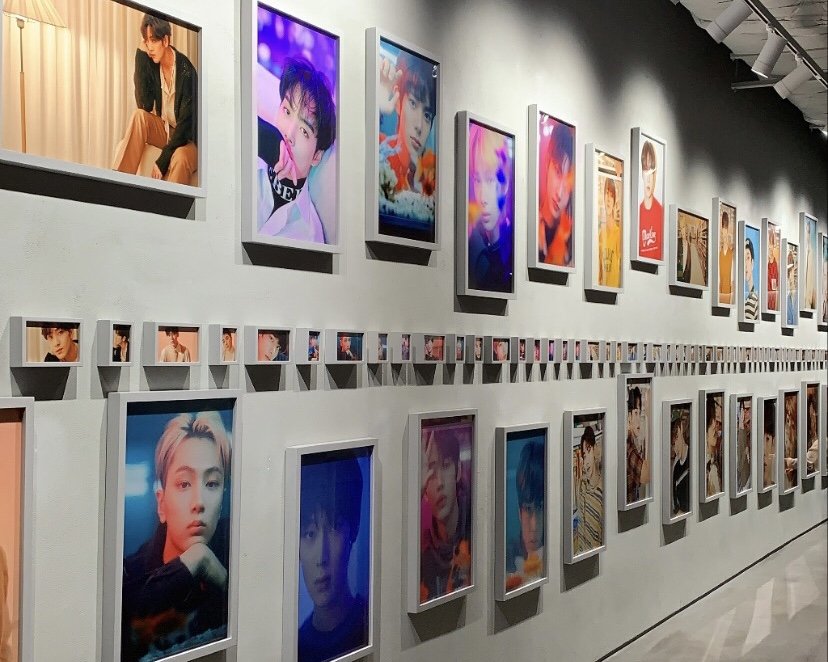What is the Hallyu Wave?
‘Hanryu’ — commonly romanised as ‘Hallyu’ — or ‘the Korean Wave’, gained prevalence in the late 1990s to early 2000s when South Korea’s economy saw a rapid incline, famously known as the ‘Miracle on the Han River’.
The ‘HYBE INSIGHT’ museum is one of many exhibitions using the K-pop influence to attract foreigners to South Korea. Photo: Abby White.
Twenty years on and the influence of Hallyu has arguably never been stronger, but how did Korean pop culture get to our screens here in the West and why is it so popular?
‘Hanryu’/‘Hallyu’ — ‘Han’ referring to Korea and ‘Ryu’ meaning wave — has come to dominate modern pop culture narratives in the last twenty years. While there is a broad spectrum of what exactly can be defined as part of Hallyu, it can often be boiled down to five main categories: music (most noticeably K-pop), film and TV (or ‘K-dramas’), comics or Manhwa, Korean fashion, and Korean skincare and make-up. Through these channels, South Korea has built an empire of rich pop culture and established new kinds of pop culture industries and production systems that have led to an estimated $12.3 billion boost to the Korean economy in 2019.
It comes as no surprise that the South Korean government has used Hallyu to its advantage as a tool for so-called ‘soft-power’ in which a government uses pop culture to wield a positive image of the country. It has also been used to attract tourism to South Korea, with government-led promotions using idols to entice fans to come and see them in concert — in 2020, the Ministry of Culture, Sports, and Tourism pledged $1.42 billion as part of its plan to boost global sales of Korean cultural content.
BTS named ‘Special Envoys’ for future generations and culture by South Korean President Moon Jae-In as a result of their impact on Hallyu and sharing their culture with fans across the globe.
The Downfalls of Hallyu
While Hallyu has created a new positive influence on the world, it is certainly not perfect. Korean pop culture industries have been the subject of scandal and tragedy in recent years. In 2019, BIGBANG’s Seungri, as well as other popular names, were involved in ‘The Burning Sun’ scandal which spanned allegations of sexual assault, prostitution, drug distribution, hidden camera footage, tax evasion, and police corruption.
In 2017, SHINee boy-group member, Jonghyun, took his own life after struggling with depression, and in 2019, another SM entertainment artist, Sulli, was found dead after suffering from online abuse. An exploitative culture, including abusive training regimes, and so-called “slave contracts,” where an artist’s personal life and public conduct is scrutinised freely, has also been uncovered in Hallyu.
SHINee members pay tribute to Jonghyun on his birthday.
The K-pop industry especially, with most groups now having some experience of promoting in America, is also being criticised for its insensitivity towards more westernised social issues. Instances of idols being caught saying racial slurs and companies styling their groups in inappropriate hairstyles and outfits has unfortunately been happening time and time again. Despite the Black Lives Matter movement being recognised world-wide in 2020, we are still witnessing uneducated and insensitive behaviour from leaders of the industry - most recently from trending girl group Aespa member, Giselle, who publicly apologised in October 2021 for mouthing a racial slur in the behind the scenes video of their newest title track ‘Savage’.
If Hallyu has any chance of gaining more momentum in the West, there can be no more instances of racist behaviour, regardless of how progressive South Korean society is argued to be.
Climbing over the ‘one-inch barrier’
When Hallyu first broke overseas in Asia in the 1990s, the main effects were seen in China and Japan. It then took over Southeast Asia but it was not until around the 2010s that Hallyu reached the West. Most point to one music video in particular to thank for the West’s introduction to Hallyu: the 2012 release of PSY’s ‘Gangnam Style’. This music video became one of South Korea’s first global viral pop culture hits, and in December of 2012 it became the first video to ever reach one billion views on YouTube.
Following his success, PSY founded the South Korean record label and entertainment agency ‘P Nation’ in October 2018. Signed artists include Jessi, HyunA and pre-debut boy group P Nation Loud.
Following PSY’s viral sensation, it was only a matter of time before the West entered the world of K-pop. K-pop boy group BTS has been praised for being the first K-pop group to actively build a truly global fan base and with their promotions in the United States (beginning in 2017) and their newly released English language singles from 2020, BTS have become a gateway for western audiences into the world of South Korean popular media. BTS has arguably had the biggest Hallyu influence the West has ever seen, and in accepting BTS and their music, western audiences have become more open minded to other South Korean media, including that of TV and film.
In 2016, Zombie-thriller movie, ‘Train to Busan’, was released, instantly becoming a top-grossing film domestically. Yet despite the success in its home country, the film did not reach a more international audience until much later after its release. Now, ‘Train to Busan’ is recognised as a must-see for any wishing to dive deeper into Hallyu film. In comparison, the Oscar nominated film ‘Parasite’ (2019) and Academy Award nominated ‘Minari’ (2021), were released into an environment already aware of what South Korean filmmakers could offer and so became popular in the West almost as quickly as their popularity rose domestically. The effect of Hallyu is also clear to see with the recent release of ‘Squid Game’ (2021), now being branded as Netflix’s most watched show with 111m views.
Bong Joon-Ho, director of ‘Parasite’, famously pointed out the “one-inch tall barrier” that was preventing westerners from being exposed to a rich array of non-English language films. It does not seem too optimistic to hope that westerns will begin to watch more of, not only South Korean films, but foreign language films in general. Hollywood remakes of foreign films may become a thing of the past, since audiences may now be more willing to watch originals, regardless of the subtitle requirement and the film industry itself may become more diverse in content.
‘I got so invested that I decided to learn Korean at university’
Now more than ever before, western students (like myself) are choosing Seoul as their study abroad destination, and some are even choosing to learn the language because of their love for Hallyu. Graduates too, are looking to Korea to gain some life experience while teaching their native language abroad.
I spoke to Louie Quinery, 21, a student from Birmingham, with the goal of living and studying in Seoul, as well as Kristina Phillips, 26, from Exeter, who is currently teaching English in Seoul, about their opinions of Hallyu. Specifically, I wanted to know what the biggest Hallyu influence was on them and how that influence has inspired them to move their lives abroad to South Korea.
Korean Studies student, Louie, spoke to us about Hallyu’s influence on her life.
“SHINee was my ticket to the K-pop world,” said Louie, a third-year Korean language student, “In 2008, I stumbled upon them and fell in love with their debut album.”
Louie told me how a domino effect began on her love for Korean pop music, following her discovery of SHINee. “I kind of immersed myself in K-pop and got into other groups while also watching a lot of shows like ‘Weekly Idol’ and ‘Hello Baby’,” she said.
This introduction to Hallyu content inspired Louie to immerse herself in the culture further. “I got so invested that I decided to learn the Korean language at university,” she explained.
Kristina at Bukchon Hanok Village, Seoul, South Korea.
I also spoke to Kristina, who is currently living in Seoul and teaching English to Korean students. “I was more obsessed with Korean skincare than anything else,” she told me, “When I was studying Japanese at university, I met a lot of people who were interested in Asian culture and particularly in K-pop.”
Kristina too, learnt a lot about South Korea as a country through the exposure Hallyu brought to the UK. “I never really knew a lot about South Korea before I discovered K-pop and K-beauty, so my opinion [about South Korea] has changed a lot,” she said, “Initially, my plan was to live abroad in Japan. However, since getting to know Korean culture better, I realised Korea as a country was a better fit for me culturally, as opposed to Japan.”
The future of Hallyu
Looking to the past and analysing the foundations of the Hallyu empire and its expansion to the West, it cannot be denied that Hallyu has a strong future here. And, if business leaders play their cards right, we may see the worldwide entertainment industry look to South Korea, instead of the States, for new trends in popular culture.
With Seoul becoming an increasingly popular study and work abroad destination, and with more foreigners being open to consuming South Korean media, perhaps we will see Hallyu expand further into Korean language, culture, and daily life - a few years ago, many westerners could not think of one Korean word, now, terminology such as ‘mokbang’ (a coined word describing an eating broadcast and deriving from the Korean words ‘to eat’ and ‘broadcast’) slips into our daily conversations.
Hallyu has become a pathway for diversifying our cultural knowledge about South Korea and the East in general, and perhaps other countries will look to spread their own cultural experiences through a similar medium.
One thing is for certain, and that is that Hallyu will not be dwindling in popularity anytime soon, as every year, new South Korean media is released and new records are made in the West - we only have to look so far as the recent success of ‘Squid Game’ and BTS (Winners of the Best Pop Group award at the 2021 American Music Awards) to understand how Hallyu can become a worldwide trend in a matter of weeks.



